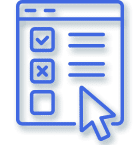What Does an Addiction Counselor in Alaska Do? What is Their Job Role?
Walking into a new job as a behavioral health substance abuse counselor requires a few steps before your first day of work. You’re likely to begin working with a provisional license. Once you have this temporary form, you’ll have to begin working on getting your study materials together. Your supervisor will also tell you where you can go to apply to take your first, official counselor certification test. You’ll find out when the test is and what kinds of questions you’ll have to answer.
Using your college substance abuse counseling textbooks, review the behavioral health materials you’ve been studying for the past three to seven years, because the exam is pretty likely to be a wide-ranging one. The topics will be comprehensive, asking about some of the most basic information you learned in your first years of college, as you began working on your major. So, don’t forget about reviewing these earlier textbooks. Plan on reviewing material from every year that you were in school because it’s likely to be on the licensing exam.
Depending on the specific job role you’ll have, your licensure will have to fit that position. Learn as much as you can as you are applying for the exam. As a clinical substance abuse counselor in a rehab facility, your supervisor will be supervising you. That’s a required element of the job for every behavioral health specialist.
Once you pass your behavioral health licensing exam, that’s not the end of it. You’ll have to attend seminars and training sessions where you’ll be earning continuing education hours. Every year or two, you’re going to have to document those hours to the state of Alaska so you can renew your licensure.
Compare Popular Online Substance Abuse Counseling Programs
Alaska Licensing & Certifications for Associates & Independent Counselors
In Alaska, six types of licensure are available.
Counselor technician
The counselor technician is the most basic level of licensure. You’ll still have to have one year’s worth of experience or a combination of 2,000 hours of clinical practice. You can substitute with 150 contact training hours. (Training only requires 96 contact hours).
Chemical dependency counselor I
The chemical dependency counselor I is the next highest level. You need to have two years of professional experience or your counseling degree plus one year of experience. You’ll have to complete 270 contact hours for your training.
Chemical dependency counselor II
Next is the chemical dependency counselor II. Here, you need three years of experience or your degree plus two years of experience. You can also have an advanced (masters or higher) degree and one year of experience. Accumulate 270 contact hours for training.
Administrator I
The next level is the administrator I. You need to have two years of experience with one of those years taking place in a state-licensed program. Your training will consist of 30 contact hours.
Administrator II
The administrator II is the next highest licensing level. Here, you need five years of experience, with one of those years taking place in a state-approved program. Your training consists of 70 contact hours.
Chemical dependency clinical supervisor
Finally, the chemical dependency clinical supervisor is the highest licensure level in Alaska. At this level, you need five years of experience. Your degree plus four years is acceptable. Or you can have an advanced degree plus three years of experience. Your training contact hours will go back up to 270.
Education Requirements for Practice
Your educational requirements vary by licensing levels.
Counselor education requirements
The counselor technician 1 should take confidentiality and ethics classes, four hours each, required of every behavioral health and social services professional. Take eight hours of infectious diseases and HIV/AIDS-related classes. Because of where you plan to work, take eight hours of CPR and first aid classes.
As you get into the counseling and psychology course work, you’ll be taking classes in counseling, introduction to addictive behaviors and cross-cultural diversity. Eight hours of crisis intervention will be required, as will a class in documentation.
You’ll also take eight hours of introduction to community resources and another eight hours of recovery, health, wellness and self-care.
Your class work here will be a little different. Expect to take introduction to co-occurring disorders, eight hours. You’ll have to fulfill 100 practicum hours. Otherwise, your course work will be as above.
Administrator Education Needed
If you are shooting for an administrator 1 position, expect to take the ethics, confidentiality and cross-cultural diversity classes. You’ll need 16 hours of the diversity classes. Along with the infectious diseases and HIV/AIDS classes, you’ll also take six hours of “Alaska history of chemical dependency” and “introduction to addictive behaviors,” eight hours.
For an administrator II position, you’ll take the same classes that you took for the administrator 1 position.
Supervisor education requirements
Finally, the chemical dependency clinical supervisor takes classes required for this level. In addition, you should take 30 hours of supervisor training.
(CACREP) or (CORE) Licensure and Counselor Certification

Two types of substance abuse counseling accreditations are recognized in the United States; institutional and specialized counselor certification. Institutional accreditation takes the entire institution into account while the specialized focus on professional preparation programs. The Council for Accreditation of Counseling and Related Educational Programs (CACREP) is a specialized accreditation that focuses on master’s and doctoral degree programs in counseling at colleges and universities worldwide. Only already-accredited institutions are eligible for CACREP review. The review for accreditation will center on programs offering graduate degrees in counseling.
Find Your Online Addiction Counseling Program
Choosing a CACREP-accredited program ensures that the program meets the highest of quality standards. Many counseling specialties are accredited bythe CACREP, including addiction counseling. Accredited addiction counseling programs prepare individuals to work with those affected by addictive behavior and their families. Addictive behaviors include alcohol, drugs, food, gambling, sex, and anything else that negatively affects your personal or work life by creating addiction behaviors.
CACREP-accredited programs will focus on treatment models and the phases of addiction including prevention, recovery, and relapse prevention. These 60-semester hour programs will include the application of interventions. When students choose a CACREP-accredited program they can be confident that:
- the program meets or exceeds national standards
- the program will focus on professional counseling rather than psychology oreducation
- the program has an excellent reputation
- CACREP graduates statistically receive higher scores on the National Counselor Examination for Licensure and Certification (NCE).
- the requirements for licensure will be met.
Board of Professional Counselors
The Alaska Board of Professional Counselors regulates and enforces all laws that govern professional counseling practices. The Board is responsible for licensing decisions and imposing disciplinary actions when counselors violate laws. Be aware that the process to obtain a new counselor’s license can take three months or more after an application is completed.
Address
P.O. Box 110806Juneau,
AK 99811-0806
Phone
(907) 465-2974
Website Address
https://www.commerce.alaska.gov/web/cbpl/ProfessionalLicensing/ProfessionalCounselors.aspx
Licensure:
- Licensed Professional Counselor (LPC)
Counselor Testing & Examination Process

In Alaska, substance abuse counselors are tested under the National Counselor Examination for Licensure and Certification. You may also be given the National Clinical Mental Health Counseling Examination. Your test, whichever one you are given, will be given by the National Board of Certified Counselors, Inc. To receive your substance abuse counselor license to practice in Alaska, you have to pass your exam by a certain percentage.
Reciprocity
If your situation means that you have moved to Alaska from another state, the Alaska board of examiners may accept a passing score given by another nationally recognized exam for professional counselors. This exam has to be equal to the national counselor exam or national clinical mental health counseling exam.
If you have passed one of these exams but you still haven’t received your initial license within three years of taking and passing the exam, you’ll be required to retake the exam again, unless you can show proof of good cause for not receiving your state license to practice.
When you apply to take the exam for the first time, you’ll have to do so online. Rather than providing a scanned original signature, you’ll have to provide an electronic signature (e-signature). If you don’t feel comfortable applying to take the exam online, you need to request a paper registration. You’ll have to pay through money order.
Clinical Supervision Explained

A substance abuse counselor is supervised in every aspect of their work. Supervised experience is required by Alaska state law. As of July 1, 2007, counselors’ supervised hours will only be accepted if they are supervised by someone who is certified by the state.
You should expect half of the required 100 hours of face-to-face supervision will be completed only in a one-on-one by a qualified and certified supervisor. (Think of individual therapy sessions with your clients.) The remaining face-to-face supervised hours can be completed either in a group setting or a one-on-one setting. (Group counseling sessions or individual therapy sessions.)
Because Alaska is highly rural, you may work in a rehab facility that is located at a distance from your direct supervisor. The Alaska legislature took this into account and added a subsection to the supervised experience regulation. Just submit a written request to the Board of Counselors and request supervision by electronic or telephonic means, which would be in lieu of the face-to-face requirement. Your request will be considered for approval if your approved counselor supervisor doesn’t practice or work within a “reasonable distance” of your location. A second circumstance may arise if your immediate supervisor can’t provide appropriate supervision because of their relationship to you. Another issue may be that their supervision may lead to a potential conflict of interest. If there are other “good cause” situations that make face-to-face supervision with your immediate supervisor who works at your location impossible, let the Board of Counselors know about this in writing.
Renewal and Continuing Education

You’ll have to ensure that you can renew your license to practice so you can continue working with your clients. Complete the required number of continuing education contact hours, with at least three of those hours devoted to professional ethics.
If you have had your license for less than 12 months, complete at least 20 contact hours for your first biennial renewal. If you have had your license for at least one full year, but less than 18 months, complete at least 30 contact hours. If you have held your license for 18 months or more, complete 40 contact hours. For your second biennial renewal and subsequent renewals, complete 40 contact hours.
One continuing education contact hour is 50 minutes of professional education between you and an instructor. This does include instruction in real-time audio and audio-visual class presentations.
If you are enrolled in an academic program, the Board of Counselors will accept one semester’s academic credit, which converts to 15 contact hours. One quarter academic credit converts to 10 contact hours.
Seminars, workshops and courses that are offered by an approved organization will be approved as long as the organization has specified the number of continuing education units that will be awarded at the end of the seminar or class. These contact hours will be equal to the total number of continuing education units.
At least 20 of your continuing education contact hours should be earned in attending courses or seminars that are taking place at the same time as others. In other words, you may find yourself taking more than one seminar or course at the same time.
No more than one-half of the required total of your contact hours can take place in a videotape, correspondence, audiocassette or individual study program.
You’ll only receive credit for the hours of actual attendance in an academic course that you are auditing. These hours can’t be more than the number of academic credit hours that are offered for that class.
You can apply credits from seminars, postgraduate classes and workshops offered by nationally or regionally accredited universities or colleges. You may audit or take the course for academic credit. Courses from these resources are acceptable:
- Alaska Counseling Association
- American Counseling Association
- American Association of State Social Work Board
- American Psychological Association
- National Association of Social Workers
- National Board of Certified Counselors
- American Association for Marital and Family Therapy
- Alaska Commission for Behavioral Health Certification
- Alaska Psychological Association
- American School Counselor Association
- Alaska Chapter of the National Association of Social Workers
- Alaska Department of Health and Social Services
- Co-Occurring Disorders Institute, Inc.
- National Association of Alcohol and Drug Abuse Counselors
- Trust Training Cooperative
- Regional Alcohol and Drug Abuse Counselor Training Program
- Any cross-disciplinary classes, seminars or workshops in medicine, law, ethics, behavioral sciences or related disciplines.
Potential Counselor Career Path Options
- Addiction Counselor
- Alcohol and Drug Addiction Counselor
- Behavioral Health Specialist
- Certified Addiction Drug and Alcohol Counselor
- Chemical Dependency Counselor
- Mental Health Counselor
- School Counselor
- Substance Abuse Counselor
Associations & Organizations
Existing Alaska associations include the American Association for Marriage and Family Therapy, American Counseling Association and American Psychiatric Association. The Alaska Chapter of the National Association of Social Workers and the Center for Human Development are also included.
